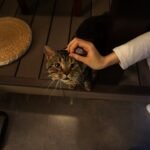Have you ever looked at your cat lounging on the windowsill, eyes half-closed, and wondered if they even care that you exist? It’s a question that plagues cat lovers everywhere: do cats love us the way dogs do, or are they simply using us for food and shelter? The answer might just surprise you — cats can be deeply devoted companions, but their way of showing love is subtle, mysterious, and often misunderstood. If you think cats are aloof or indifferent, get ready to discover a whole new side of feline devotion that’s been hiding in plain sight.
The Myth of the Aloof Cat

The stereotype of cats as cold, standoffish creatures has been around for ages. Many people believe that cats are only interested in themselves, unlike dogs, who wear their hearts on their sleeves. But is this really true? In reality, cats have a different emotional language than dogs. While dogs might jump, wag, and slobber all over you, cats prefer a quieter, more understated approach. Sometimes, their love is so gentle that it goes unnoticed, like a soft whisper in a noisy room. If you’ve ever felt a gentle head bump or found a cat curled up at your feet, you’ve experienced their subtle affection firsthand.
Understanding Feline Attachment

Cats form deep attachments to their humans, but they express it in their own unique ways. Recent studies show that cats can form secure bonds with their owners, much like children do with their parents. This connection isn’t always about constant attention or physical closeness; sometimes, it’s about trust and comfort. If your cat follows you from room to room or finds you when they’re anxious, that’s a telltale sign of their devotion. Unlike dogs, who crave approval, cats express loyalty by choosing to be near you — even if it’s just quietly sharing a space.
Body Language: The Silent Love Letters

Cats are masters of subtle communication. Their devotion is hidden in the swish of a tail, a gentle slow blink, or a casual flop onto their backs. These little gestures are love letters written in a secret code. For instance, when a cat blinks slowly at you, it’s a sign of deep trust — almost like blowing a kiss in cat language. If your cat exposes their belly, they’re showing ultimate vulnerability, which is a huge compliment. Understanding these signals can unlock a whole new world of connection with your cat.
The Power of Routine and Devotion

One of the most surprising ways cats show devotion is through their love of routine. Cats thrive on predictability, and when they include you in their daily rituals, it’s a sign that you matter. Maybe your cat greets you at the door every evening or insists on sitting beside you during breakfast. These routines aren’t just habits — they’re acts of devotion. By weaving you into their schedule, your cat is saying, “You’re an important part of my world.”
Following You: The Shadow Cat Phenomenon

Have you ever noticed your cat trailing you like a silent shadow? This behavior is a clear sign of attachment. While it might not be as obvious as a dog waiting at the door, a cat’s quiet presence is just as meaningful. Some cats will sit outside the bathroom or perch nearby as you work, offering silent companionship. They don’t demand attention; they just want to be close. It’s their way of saying, “I trust you. I want to be where you are.”
The Gift of the Hunt

As odd as it may seem, when your cat brings you a “gift”—be it a toy, sock, or the occasional unfortunate mouse—they’re demonstrating their devotion. In the wild, sharing prey is an act of trust and care. By offering you their prize, cats are including you in their inner circle. Even if the offering makes you cringe, remember: it’s a heartfelt gesture from your little hunter.
Sleeping Beside You: A Token of Trust

For cats, sleep is a vulnerable state. Choosing to sleep on your bed, next to you, or even on your lap, is a sign of ultimate trust. They could curl up anywhere, yet they choose you. This isn’t mere convenience; it’s a declaration of safety and affection. Many cat owners can recall nights when their feline friend quietly appeared, nestled beside them, purring softly — a wordless statement of love.
Head Butts and Rubs: The Scent of Affection

When a cat head-butts you or rubs their face against you, they’re marking you with their scent. This behavior, called bunting, is not just about territory; it’s about family. By sharing their scent, cats are claiming you as their own. It’s a quiet yet powerful way to say, “You belong with me.” Next time you feel that gentle nudge, know that it’s a feline hug — invisible, but deeply meaningful.
Vocalizations: The Song of Devotion

Not all cats are chatty, but those who are often develop a unique “language” with their chosen humans. From soft chirps to insistent meows, these sounds are more than background noise. They’re conversations, invitations, and sometimes even pleas for attention. Each vocalization is tailored to you, reflecting the special bond you share. It’s your cat’s way of saying, “Talk to me. I want to connect.”
Grooming: Love in Licks

Grooming isn’t just about cleanliness — it’s a bonding ritual. When your cat grooms you, whether it’s a lick on your hand or a nibble on your hair, they’re treating you like family. In the wild, cats groom those they trust most. This intimate gesture is a sign of acceptance and care, reserved for those they hold dear. So, if your cat gives you a little “bath,” take it as the ultimate compliment.
Protective Instincts: The Silent Guardian

Cats may not bark at intruders, but their protective instincts run deep. Some cats will position themselves between their owner and a perceived threat, or keep a watchful eye on unfamiliar guests. This quiet vigilance is a sign of devotion. They might not leap to your defense like a dog, but their loyalty is unwavering. The next time your cat stands guard at the window, remember: you have a silent protector by your side.
Returning After Absence: The Joyful Reunion

Cats may act cool when you return home, but watch closely. Even the most reserved feline will often greet you with a tail held high, a soft purr, or a gentle nuzzle. These understated welcomes are their way of saying, “I missed you.” Some cats will even vocalize more or follow you more closely after you’ve been away, showing that your absence was felt. Their devotion is quiet, but it runs deep.
Helping Hands: When Cats Sense Your Mood

Cats are incredibly sensitive to human emotions. Many people report their cats becoming extra affectionate when they’re sad, sick, or stressed. A cat might curl up beside you when you’re having a tough day or gently nuzzle your hand when you need comfort. This empathy is a sign of deep connection. While they may not shower you with kisses like a dog, their quiet presence can be a powerful balm for the soul.
Consistency Over Flashiness

While dogs are known for their big, bold displays of love, cats show theirs through consistency. It’s the daily rituals, the silent companionship, the soft purrs, and the gentle head bumps that add up over time. These small, steady gestures can be even more meaningful than grand overtures. When you look back, you’ll realize just how much your cat was there for you, every single day.
Respecting Boundaries: Love on Their Own Terms

Cats are famous for their independence, but this doesn’t mean they’re not devoted. In fact, respecting your boundaries — and expecting you to respect theirs — is part of their love language. A cat who chooses to sit nearby, rather than on your lap, is still showing affection. They want to be close, but in a way that feels right to them. This mutual respect forms the foundation of a strong, lasting bond.
Affection for One Special Person

Unlike dogs, who often love everyone they meet, cats tend to form deep attachments to one or two people. If you’re the chosen one, consider yourself lucky. Your cat’s devotion is focused, intense, and deeply personal. They may ignore strangers, but they light up when you walk into the room. This selective affection makes their love feel even more special — a secret shared between just the two of you.
Independence Doesn’t Mean Indifference

It’s easy to mistake a cat’s independence for a lack of devotion, but nothing could be further from the truth. Cats are wired to be self-reliant, but that doesn’t mean they don’t care. In fact, their choice to return to you, day after day, is a powerful statement of loyalty. They could go anywhere, yet they choose to be with you. That’s devotion, plain and simple.
Playful Bonds: The Language of Fun

Play is another way cats show their love. When your cat brings you a toy or invites you to a game of chase, they’re sharing their joy with you. This playful interaction strengthens your bond and creates lasting memories. Cats don’t play with just anyone; they reserve their silly side for those they trust most. If your cat wants to play, they’re inviting you into their world.
Cats Remember: The Power of Memory

Cats have excellent memories, especially when it comes to people they care about. They remember your voice, your scent, and your routines. If you’ve ever moved away and returned years later, you might be surprised to find your cat still recognizes you. This long-lasting memory is a testament to their devotion. They don’t forget the people who matter most.
The Unseen Depths of Feline Love

When you open your heart to a cat, you enter a world of quiet devotion. Their love isn’t always obvious, but it is fierce and unwavering. They may not wag their tails or leap into your arms, but they show up in a thousand small ways that add up to something truly special. Next time your cat gives you a slow blink or curls up at your feet, remember: you are loved, just in a language that’s all their own.

Growing up traveling and experiencing new cultures and wonders, I have had a passion for nature, adventuring, photography, and videography. I am currently working towards a BSc in Biodiversity and Ecology at Stellenbosch University, and I hope to specialise in Marine Sciences one day.
Please send any feedback to Feedback@animalsaroundtheglobe.com






